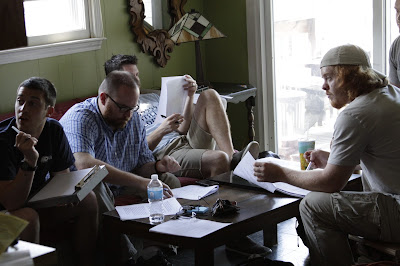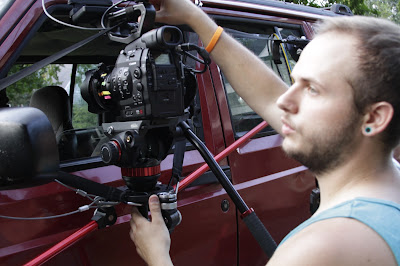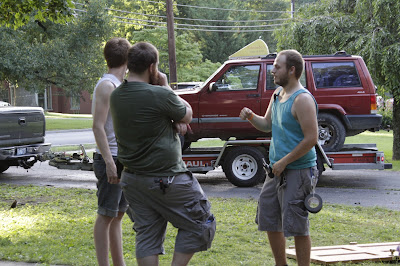It’s a wrap! No, not the movie. That comes
next week. After six straight days filming at the Spencer House, here in
Lawrenceburg, KY, it’s time to call this location a wrap.
Today, the crew is preparing for an
overnight shoot. Once again, it’s time for the old Jeep Cherokee to make its
way onto the streets Lawrenceburg and the immediate surrounding area.
Sophie, who is the main female character in
our film, affectionately calls her ride Sally. Our crew has worked hard to
outfit and rig Sally with a spider mount, which is crucial in order to support
our camera. Sally is then placed on an auto transport and then towed. As I said
it’s a lot of work to get this right. It’s also a very time-consuming process;
however, it is worth the effort because we are getting great shots with this
technique. After all, the bottom line is “it’s all about making a great movie”.
Before I go any further, I want to write a
disclaimer—not that anybody is complaining about working on the film or complaining
about our tight schedule. I just thought you might like to know the type of
sacrifice everyone is making. The days have been long. Most people working on
Hope Bridge put in between 12 to 14 hours each day. In addition, they also have
to drive 45 minutes to their hotel or dorm. And remember, they have to do this
for six consecutive days before getting one day off. When you’re making a
movie, it literally consumes every moment of your day. You’re fortunate to get
a little rest or sleep before you have to do it all over again.
This crew is amazing. I haven’t heard one
word of complaining. It sure helps that practically everyone in the production
of Hope Bridge is under the age of 25. Thank goodness for youth and energy.
I’ve been asked why our schedule is so
tight. Why is it only an 18-day shoot? You may not realize this but most
typical studio films have a production schedule ranging from 36 to 120 days. What
a luxury!
Hope Bridge is no different than any other
low-budget, independent film. There’s nothing magical about 18 days. Our budget
would only allow us to shoot longer than 18 days. Each day is expensive to be
in production. You burn through money at an unbelievable rate. You have to pay
for equipment rental, food, hotels, actors, props, and locations—just to name a
few. Sure, it would have been nice to have a few extra days. But our cast and
crew believe in this project and are willing to make the necessary sacrifices.
There’s really no magic about filmmaking.
It all comes down to hard work and a willingness to do whatever you have to do
to get the job done. You might ask how we make this 18-day schedule work. That
job belongs to Isaac Stambaugh, who is our Unit Production Manager. It’s one of
the most important jobs on set. Sometimes in the industry it’s referred to as a
Line Producer or a Director of Production.
Isaac’s job is to come up with a production
schedule which serves as the blueprint or bible for Hope Bridge. Think of Isaac
as a general moving his pieces around the board. He has to group actors,
equipment, vehicles, locations and props in such a way as to utilize their
effectiveness. But, more importantly, they have to be cost-effective. A
production schedule tells you what is going to happen each day, which scenes
will be shot, how long they will take, and how many pages will be produced. For
example, in our production schedule, six days were planned at one location, the
Spencer House. We don’t shoot at the Spencer House and then shoot somewhere
else and then come back to the Spencer House. That wouldn’t make any sense. Obviously,
that means that the scenes are shot out of sequence. But it’s the only way to
efficiently maximize our resources and stay in budget.
Another example is Kevin Sabo who played
the counselor. He had only four days of work in the script; therefore, you
would want a schedule having him working four consecutive days. It would make
no sense to have an actor sitting around doing nothing.
Isaac has pulled off a miracle and made our
schedule work. A good Unit Production Manager has to know just about everything
concerning the production cycle in order to make everything work.
I asked Isaac how he thought things were
going. “We’re on budget, and we’re on time, but that could change in the next
hour. We’ve got usable footage. But next week we have a couple of big days on
Tuesday and Wednesday. We’re not home yet.” It’s Isaac’s job to worry. In fact,
if Isaac’s not worried, he’s worried about not being worried. Keep up the good
work Isaac. You’ve gotten us this far.
More to come.











No comments:
Post a Comment